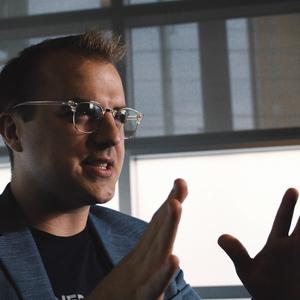Mental health, particularly as it relates to the workplace, has been a hot topic throughout the course of the Covid-19 pandemic. That remains especially true for entrepreneurs and startup founders.
It’s difficult to run a successful business without support, especially in the initial startup phases. Many entrepreneurs rely on extremely limited funding, must ask friends and family for startup operation costs or wait anxiously for responses on loan approvals — all in the hopes of launching a successful endeavor. Some quit full-time jobs but still have families to support. Compound these stresses with the angst surrounding the ongoing pandemic, and mental health is something be conscious of in the Birmingham community.
Multiple studies have cited entrepreneurs as having a higher-than-average rate of anxiety and depression. An Inc.com article also notes that some of the same traits that make someone well-suited to entrepreneurship can make that person vulnerable to mental health diseases.
To gain a greater understanding of mental health in our local startup ecosystem, several metro area founders and entrepreneurs opened up and discussed their experiences with mental health, what they have felt while doing their jobs and what needs to be done to try to alleviate mental health issues for other people in the ecosystem.
Nate Schmidt
Managing director, Techstars Energytech Accelerator
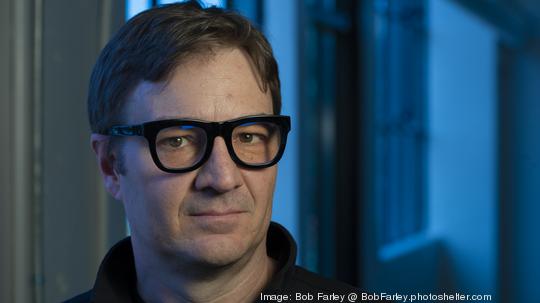
Nate Schmidt has had an extensive career as an entrepreneur, spending a large amount of time working with business founders.
He said both groups deal with all forms of stress, anxiety and depression — like all of society — but entrepreneurs feel it even more keenly.
“I always call it a double whammy that people who are prone to stress, anxiety and depression are also people that are prone to starting companies — (they have) a really active brain that causes you to want to go explore new ideas,” Schmidt said. “And also, starting a company makes you stressed out. It’s a difficult job, and it can be a lonely job.”
Schmidt has personally experienced mental health challenges during his career.
“I regularly deal with anxiety. I have dealt with depression. And … losing a founder at Velocity Accelerator was really the impetus for me to start speaking about this more and thinking about it more and thinking about my own mental health issues more,” Schmidt said. “Another reason that I speak about mental health issues is to hopefully catch some people that are really struggling and maybe struggling where they might be having thoughts of harming themselves. That’s not something that I have personally dealt with, but I’ve now talked to many entrepreneurs that have dealt with severe mental health issues to the point where it would be considered at risk in some way.”
Schmidt considers the local startup community to be very supportive of one another and said considerable resources are available for startup founders. However, he said the community has missed out on a lot of the face-to-face elements the past couple years that made the entrepreneurial community even stronger. He is hoping to begin reclaiming some of those interactions as the pandemic subsides.
Jacqueline Jones
CEO, One Degree Marketing
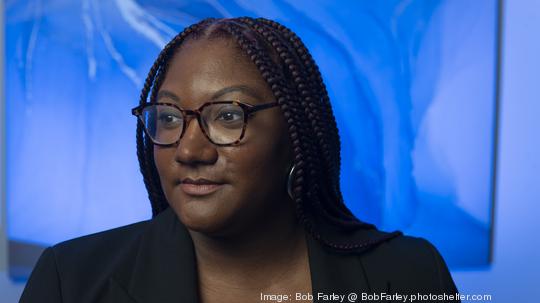
Jacqueline Jones started her own business in 2013 but was also working full time.
In 2018, she quit her primary gig to devote all her attention to One Degree Marketing.
During her journey, stress was prevalent, but it has also been fun to some extent, she said.
In 2019, she recorded a TED Talk on the unspoken effects and struggles of entrepreneurship and the balancing of home life and business life.
“(In entrepreneurship you are) dealing with the unknown. So much uncertainty comes with that, but (also) not really feeling like you always have a place to express that uncertainty or expressing the fears that come along with that,” she said. “And so, in that talk, I compared it to postpartum depression because I recently had a child, and it was a very similar feeling. I’m going through this ‘you’re telling me the technical stuff.’ I’m doing the technical stuff; that’s wonderful, but nobody was saying ‘Hey, this is really hard,’ and you’re not often going to feel like you have someone to share their struggles with because everyone is out here trying to make it look good.”
She also said she was trying to appear successful or put on a front while simultaneously having doubts about whether she should be tackling her own business, especially with a child, a husband, a mortgage, a job and more.
“I’m the first person in my immediate family to start a business and try to work it full time and provide jobs,” she said. “So there’s no one to give me any kind of insight into how that impacts my family and being a mom and all of that. She described her biggest challenge in terms of mental health thusly: ‘I don’t know how to deal with these feelings of uncertainty or fear in general of what will happen next,’ fear of what I was getting wrong, and how I might lose clients and what that might do for the future. No one was there to really coach me through that because nobody talks about it.”
While the pressure for Jones was serious, she recognizes that fear can be a part of the process and that it is a conscious decision to move forward. She said to have faith because things will work out.
Kristin Farmer
Founder, Curly Contessa
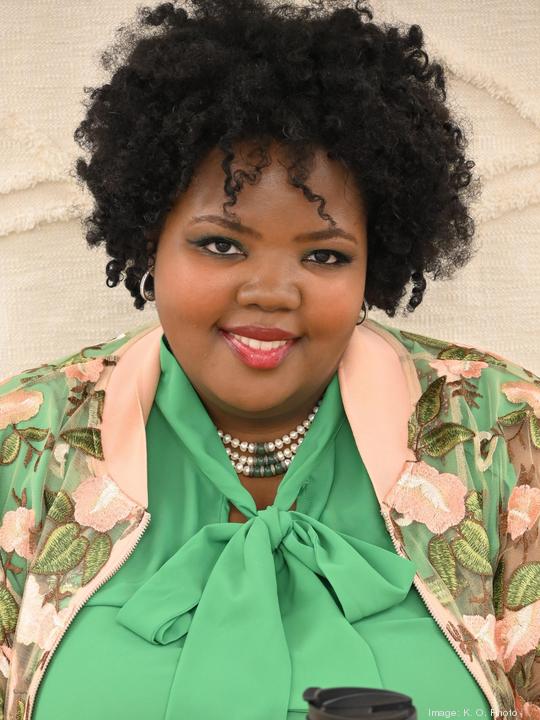
Kristin Farmer is a graphic designer who founded Curly Contessa in 2017, a home goods and giftware line for women of color.
After noticing a lack of diversity in the holiday shopping market, Farmer created a culturally relevant collection of products that now includes street wear, kitchenware and other items.
Farmer struggles with a bipolar and borderline personality disorder, but she has overcome personal challenges by creating illustrations. The entrepreneurial journey she has undertaken has been filled with plenty of ups and downs, and she said it has been challenging to always have a positive attitude. One compounding challenge is the fact things can change quickly.
“Sometimes I can get all the things done. I can go zero to 110,” Farmer said. “And then I’d have my depressive state when I’m not seeing what I want to see.”
With a borderline personality disorder, Farmer said, “I think black and white. Who am I? Why am I doing this? What does this have to offer for me? I start feeling like a failure. But there’s oftentimes this sweet moment with the gray area between knowing that I’m learning and fine-tuning as I’m going along the way.”
She also didn’t let the pandemic or civil unrest put a dent in her business growth.
“With the world searching for ways to update their decor and make intimate spaces more comfortable, I had to make quick, hard, decisions that would position Curly Contessa to serve naturalistas across the globe,” she said. “This pivot involved sourcing new vendors, hand painting new designs, and revamping my internal processes. As society mourned the loss of innocent Black lives coupled with pressures of an unprecedented pandemic, my goal was to ensure that Curly Contessa played a role in their healing. Deciding to expand my business ... has not been easy, but personal and professional rewards have been rich.”
Farmer said groups such as No More Martyrs have been helpful in her journey but notes more mental health resources are needed, especially for the Black community.
Chris Sims
CEO, CAVU
President, Sigao Studios
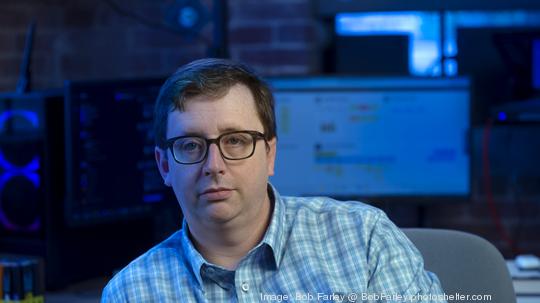
Chris Sims has built an extensive career in the tech and entrepreneurial space in Birmingham, and as he puts it, being an entrepreneur and having anxiety are one and the same.
“You can’t go out there and do big, exciting, complicated things without being a little bit crazy, because it’s a crazy thing to do,” he said. “You’re much better off taking something safe and reliable, but when you want to go down that path, it’s a lot. You’ve got the thought of making sure you pay your own bills, your own financial security accounts, plus, building a product … and then we start hiring people. You have to worry about, ‘Are they going to be sad? Are they going to have what they need?’
“And dealing with the fact things are moving so fast, and you’ll never feel like you’re moving fast enough, but you must be OK with that, so to speak. That caused a lot of anxiety. I joke that I am gaining a lot of gray hair after starting my second for-profit startup.”
He also said when you venture into entrepreneurship, it can be very lonely, and you don’t get the luxury of focusing on just one thing. This has led to Sims having anxiety and a significant level of stress.
“There’s some point I have to go be an expert accountant followed by being a marketer and then I (have) to go … teach and be our art leader, and that’s just a lot of content,” he said. “We’re seeing a lot of stress. Coaching and training is never easy because you have to deal with human problems. I have yet to meet an entrepreneur that doesn’t have some level of anxiety, depression, frustration — those kinds of things.”
One solution for him personally has been to disconnect completely from work whenever possible. He tries to take a long vacation at least once a year to decompress.
Regarding the wider startup ecosystem, Sims notes Birmingham is still a young entrepreneurial community and having more awareness and more supportive services around mental health can only benefit Birmingham’s business leaders. He said having other CEOs talk to each other and even pool resources can help take away mental health woes.
